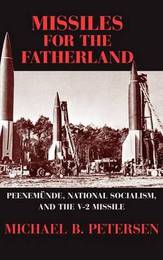
|
Missiles for the Fatherland: Peenemunde, National Socialism, and the V-2 Missile
Hardback
Main Details
| Title |
Missiles for the Fatherland: Peenemunde, National Socialism, and the V-2 Missile
|
| Authors and Contributors |
By (author) Michael B. Petersen
|
| Series | Cambridge Centennial of Flight |
|---|
| Physical Properties |
| Format:Hardback | | Pages:290 | | Dimensions(mm): Height 229,Width 160 |
|
| Category/Genre | World history - from c 1900 to now |
|---|
| ISBN/Barcode |
9780521882705
|
| Classifications | Dewey:355.8251950943 |
|---|
| Audience | | Postgraduate, Research & Scholarly | |
|---|
|
Publishing Details |
| Publisher |
Cambridge University Press
|
| Imprint |
Cambridge University Press
|
| Publication Date |
2 February 2009 |
| Publication Country |
United Kingdom
|
Description
Missiles for the Fatherland tells the story of the scientists and engineers who built the V-2 missile in Hitler's Germany. This text was the first scholarly history of the culture and society that underpinned missile development at Germany's secret missile base at Peenemunde. Using mainly primary source documents and publicly available oral history interviews, Michael Petersen examines the lives of the men and women who worked at Peenemunde and later at the underground slave labor complex called Mittelbau-Dora, where concentration camp prisoners mass-produced the V-2. His research reveals a complex interaction of professional ambition, internal cultural dynamics, military pressure, and political coercion, which coalesced in daily life at the facility. The interaction of these forces made the rapid development of the V-2 possible but also contributed to an environment in which stunning brutality could be committed against the concentration camp prisoners who manufactured the missile.
Author Biography
Michael Petersen received his Ph.D. in German history from the University of Maryland in 2005. He is currently a historian under contract with the Defense Intelligence Agency in Washington, DC, where he is writing a book on the history of the Defense Intelligence Agency in the Cold War. He has also worked for the Nazi War Crimes and Japanese Imperial Government Records Interagency Working Group (IWG) at the National Archives and Records Administration, and has contributed to a collection of essays on Japanese war crimes records held by the National Archives. He is the recipient of several fellowships and awards, including a Guggenheim Fellowship from the Smithsonian National Air and Space Museum.
ReviewsReview of the hardback: 'Michael Petersen offers a new and disturbing account of the German missile community under the Nazis at the clandestine Peenemunde facility that developed the V-2 rocket. These were not apolitical engineers blithely lost in mathematical equations and dreams of space travel, but astute professionals dedicated to destroying Germany's enemies while serving their own careers. Worse, the missile team's privileged status, comfortable living conditions, cloak of secrecy, and sense of national mission fostered knowing complicity in the crimes of the regime they served - crimes with which they and their work shall always be associated. An essential look at the perilous relationship between science and dictatorship.' Norman J. W. Goda, author of Tales from Spandau: Nazi Criminals and the Cold War, Cambridge University Press, 2006 Review of the hardback: 'Michael Petersen's Missiles for the Fatherland is an important study of the co-optation and seduction of engineers and scientists by the Nazi regime. He demolishes once-and-for-all the myth that the Peenemunde rocket engineers were apolitical technocrats more interested in going into space than building weapons. He demonstrates the intimate connection between their technical work, carried out in deepest secrecy, and the murderous exploitation of concentration-camp workers in the V-2 production program.' Michael J. Neufeld, National Air and Space Museum, Smithsonian Institution Review of the hardback: 'This book examines an important and fairly well studied subject from a different perspective by providing an anthropological and sociological study of the German rocket engineers. The social context and environment of the German rocket R & D effort in Peenemunde and elsewhere had a decisive influence on the rocket engineers and scientists and encouraged them to work on new weapons in what became a Faustian Pact with Hitler's regime. There was not that much difference between the production engineers supplied by the Armaments Ministry and the SS and the staff at Peenemunde when it came to slave labor and other issues. The Peenemunders' obsession with secrecy dovetailed with the goals and methods of the SS, and their conviction that the survival of the German nation depended on the rockets they were building diminished their concern for other groups (like POWs and concentration camp prisoners).' Mark Walker, Union College 'Peterson's sophisticated analysis is well written and belongs in every World War II library.' Central European History
|